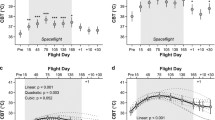Summary
Further analysis of temperature rhythms obtained in an earlier study of 38 subjects subjected to an 8-h eastward transmeridian flight showed that the extent to which the phase of the rhythm was shifted after the flight was related to the phase angle of the pre-flight rhythm. “Late peakers” shifted more than ”early peakers”, and this difference between the two types was still as large after 12 days in the new time zone as on the first day. Because the phase-shift was an “advance” one, this meant that the pre-flight individual differences in phase-angle were abolished by the flight, and had not re-appeared by the end of the observation period. It is suggested that this may have been due to an increase in the rigidity of the routine in the post-flight stage of the study, and that a similar effect may also occur in a switch from day to shiftwork.
Similar content being viewed by others
References
Adam, J., Brown, T., Colquhoun, P., Hamilton, P., Orsborn, J., Thomas, I., Worsley, D.: Nychthemeral rhythms and air trooping: some preliminary results from “Exercise Medex”. In: Aspects of human efficiency: Diurnal rhythm and loss of sleep (Ed. W. P. Colquhoun), pp. 317–326. London: English Universities Press 1972
Author information
Authors and Affiliations
Rights and permissions
About this article
Cite this article
Colquhoun, W.P. Phase shift in temperature rhythm ffter transmeridian flight, as related to pre-flight phase angle. Int. Arch Occup Environ Heath 42, 149–157 (1979). https://doi.org/10.1007/BF00377769
Received:
Accepted:
Issue Date:
DOI: https://doi.org/10.1007/BF00377769




